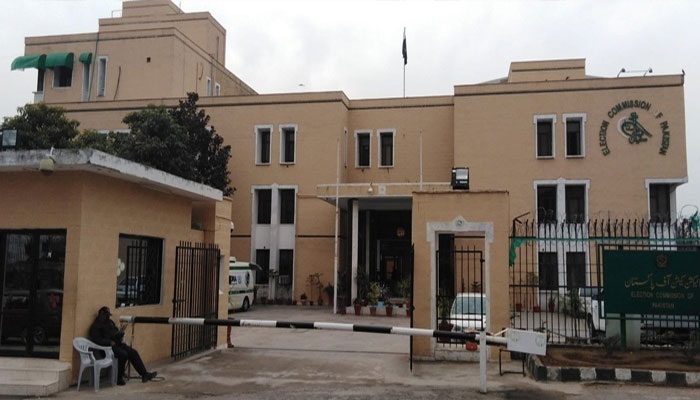Unilateral amendments to Elections Act: ECP gets opportunity to air objections to electoral reforms
ISLAMABAD: The Election Commission of Pakistan (ECP) will soon get an opportunity in a Senate panel to articulate its stand on the multitude of controversial amendments in the Elections Act recently approved by the National Assembly. The opposition parties too have got their act together and will give their response to the far-reaching changes in the poll law in the standing committee.
Three special invitees have also been requested to attend a meeting of the Senate committee on parliamentary affairs to be held on July 12. The committee will, for the first time, deliberate upon the massive amendments in the Elections Act that had been unanimously passed in 2017 during the tenure of the Pakistan Muslim League-Nawaz (PMLN) government.
The invitees include Raza Rabbani -- former Senate chairman and the former head of the bipartisan 26-member parliamentary committee that had evolved a consensus on the 18th amendment after holding consultations for more than a year-- Senator Mussadiq Malik and Senator Afnanullah Khan, both belonging to the PMLN.
The summoning notice of the parliamentary forum has also been sent to the secretaries of the ECP and the ministry of law and justice to make their comments on the amendments. While the law ministry is unlikely to go against any changes, the case of the ECP is different as it has publicly voiced its objections and reservations on 45 out of the 72 changes inserted in the Elections Act. The ECP officials had not earlier been allowed to present their standpoint in the National Assembly standing committee when it had considered these amendments.
“We, the special invitees, will be non-voting participants, and will give our opinion if sought by the committee,” Rabbani told The News when contacted. “There is no denying that several amendments violate the Constitution for which constitutional changes are required. Mere modifications in the ordinary law like the Elections Act will not suffice. The tricky amendments relate to according voting rights to overseas Pakistanis, the use of electronic voting machines (EVMs) and taking away the powers of the ECP and transferring them to the National Database & Registration Authority (Nadra). The mere call to the special invitees shows that the committee wants to give a serious thought to the views disapproving several amendments.”
Meanwhile, the Jamiat-e-Ulema-e-Islam-Fazl (JUI-F) has replaced Molvi Faiz Muhammad, its nominee in the Senate committee, with Kamran Murtaza, who is a legal expert, so that he is able to air his party’s opposition to certain amendments.
“Given my legal background, the party thought it proper to induct me in the Senate panel. A number of amendments raise question marks,” he told this correspondent. “We have done our homework and the opposition members will speak with one voice.”
Besides, Rana Mahmoodul Hassan of the PMLN and Shamim Afridi, an independent who supports the Pakistan Tehreek-e-Insaf (PTI), have also been removed from the Senate committee.
It appears that a serious attempt is likely to be made at the parliamentary platform to hammer out a consensus on the contentious amendments in the Senate, which is dominated by the opposition parties unlike the ruling coalition-controlled National Assembly.
The 13-member Senate committee is headed by PPP Senator Taj Haider, who will regulate the proceedings, and is expected to give sufficient time to the ECP representative to present his views on the amendments. The ruling coalition has seven members while the opposition has six senators in the committee.
The treasury MPs are federal ministers Dr Farogh Naseem and Azam Swati, and Senators Hilalur Rehman, Falak Naz, Liaqat Tarakai, Sania Nishtar, and Abida Azeem. The opposition is represented by Taj Haider, Mustafa Nawaz Khokhar, Farooq H Naek, Prof Sajid Mir, Azam Nazeer Tarar and Kamran Murtaza. The parliamentary affairs minister is the non-voting ex-officio member of the forum.
The dozens of amendments were unilaterally passed by the National Assembly on June 10 in a haste without any debate amid the opposition’s protest. The bill containing all but two amendments was lying unattended in the lower house of parliament for more than a year. No effort was made to clear it during this intervening period and no consultations were held between the two sides to work out an agreement.
If an accord is reached in the Senate committee on modifying certain amendments, the changed bill will be transmitted back to the National Assembly where it will be passed unanimously considering the agreement reached in the Upper House of Parliament.
However, if no understanding is reached between the two sides, the Senate could reject the bill. If that happens, the government, as it had done in the past, will take to a joint session of parliament, where it has a small majority, to get it passed.
If that happens, the opposition parties have indicated that the law will be challenged in a superior court, which could hear the point of view of the ECP as well. The opposition believes that the ECP will not renege on the position that it has publicly taken on many amendments.
The government and opposition have agreed that a concerted attempt will be made in the Senate committee to reach a consensus. The participation of the special invitees, all hailing from the opposition parties, indicates that the government may be looking for a solution to break the current stalemate on electoral reforms.
-
 Kash Patel Fires FBI Officials Behind Trump Mar-a-Lago Documents Probe, Reports Say
Kash Patel Fires FBI Officials Behind Trump Mar-a-Lago Documents Probe, Reports Say -
 Martin Short's Daughter Katherine's Death Takes Shocking Turn As Terrific Details Emerge
Martin Short's Daughter Katherine's Death Takes Shocking Turn As Terrific Details Emerge -
 Patrick Dempsey Reacts To Tragic Death Of His 'Grey's Anatomy' Co-star Eric Dane
Patrick Dempsey Reacts To Tragic Death Of His 'Grey's Anatomy' Co-star Eric Dane -
 Sidney Crosby Injury News Shakes Penguins After Olympic Tournament
Sidney Crosby Injury News Shakes Penguins After Olympic Tournament -
 Yankees Honour CC Sabathia With No. 52 Retirement This September
Yankees Honour CC Sabathia With No. 52 Retirement This September -
 Cuban Government Says Boat Full Of Armed Men Fired On Border Guards, Killing 4
Cuban Government Says Boat Full Of Armed Men Fired On Border Guards, Killing 4 -
 Lily Collins Faces Intense Pressure After Landing Audrey Hepburn Role: Source
Lily Collins Faces Intense Pressure After Landing Audrey Hepburn Role: Source -
 FIFA World Cup Security Concerns Spike After Recent Cartel Violence In Mexico
FIFA World Cup Security Concerns Spike After Recent Cartel Violence In Mexico -
 Shamed Andrew Ordered To Curb Hobby: ‘It’s A Bad Look’
Shamed Andrew Ordered To Curb Hobby: ‘It’s A Bad Look’ -
 Cardi B 'no-nonsense' Move: Why She Distanced Herself From Stefon Diggs? Source
Cardi B 'no-nonsense' Move: Why She Distanced Herself From Stefon Diggs? Source -
 Metallica Announce 2026 ‘Life Burns Faster’ Las Vegas Sphere Residency
Metallica Announce 2026 ‘Life Burns Faster’ Las Vegas Sphere Residency -
 ‘From Dating Scams To Fake Lawyers’: OpenAI Bans ChatGPT Accounts Over Misuse
‘From Dating Scams To Fake Lawyers’: OpenAI Bans ChatGPT Accounts Over Misuse -
 Amy Schumer Reveals She Pushed Through Illness Mid-performance: 'Proud I Made It'
Amy Schumer Reveals She Pushed Through Illness Mid-performance: 'Proud I Made It' -
 Shamed Andrew Can No Longer Take The ‘heat’ Of His Actions
Shamed Andrew Can No Longer Take The ‘heat’ Of His Actions -
 Royals Adamant To Show Andrew Is ‘just One Bad Apple’
Royals Adamant To Show Andrew Is ‘just One Bad Apple’ -
 Jessie Buckley Reveals Why BAFTA Win Felt Extra 'special' With Cillian Murphy
Jessie Buckley Reveals Why BAFTA Win Felt Extra 'special' With Cillian Murphy




